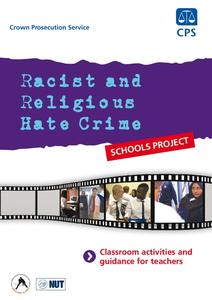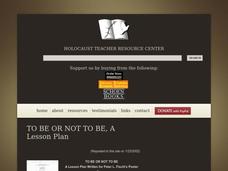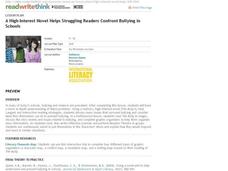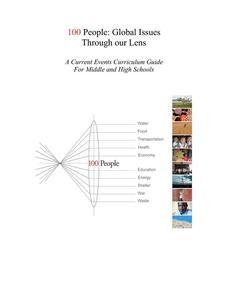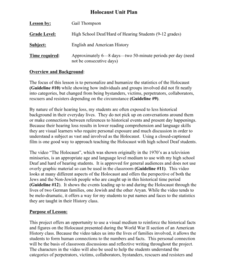Centers for Disease Control and Prevention
Measuring Bullying Victimization, Perpetration, and Bystander Experiences: A Compendium of Assessment Tools
Designed to provide tools to assess a range of bullying experiences, from perpetrators, to victims, to bystanders, the assessment tools in this packet asks pupils to rate themselves as bullies, victims, and/or bystanders. There are also...
Curated OER
Human Rights Education Handbook: Perpetrator, Victim, Bystander, Healer
Young scholars describe a time when they played different roles regarding human rights. They are divided into small groups and assigned roles of "Perpetrator," "Victim," "Bystander," and "Healer." Individual students give an example of a...
Nemours KidsHealth
Cyberbullying: Grades 9-12
A bully, a victim, and a bystander—far from the beginning of a joke, cyberbullying is no laughing matter. Bystander or upstander? As part of the study of cyberbullying, high schoolers first read a series of articles about cyberbullying...
Curated OER
Rethinking Perpetrators, Bystanders and Rescuers: The Case of Max Schmeling
The focus of this lesson is personal choice and how changing circumstances can affect one person's ethical choices. During the Holocaust, people made choices, and by placing individuals in the appropriate historical context students can...
University of Kentucky
Bullying Awareness Lessons, Activities and Resources
What are the different types of bullying? What are the impacts? What is the role of the bystander in bullying? What can be done to stop bullying? These questions are addressed by the activities included in a workshop designed for middle...
Crown Prosecution Service
Racist and Religious Hate Crime
Address the current political climate with a series of thought-provoking activities. A resource packet provides pupils with strategies for challenging racist behavior and religious prejudice, and moves them from being passive bystanders...
Curated OER
Bystanders in the Holocaust
Young scholars recognize effects of apathy and indifference, examine behaviors associated with obedience, conformity, and silence, and explore legal responses to issues raised by the Holocaust.
Curated OER
To Be Or Not To Be
Students read the poem "To the Little Polish Boy Standing With His Arms Up." They discuss the poem. Students define the term "prejudice." They comapre and contrast the boy in the poster with the author of the poem, Peter Fischl. ...
ReadWriteThink
A High-Interest Novel Helps Struggling Readers Confront Bullying in Schools
Paul Langan's novel The Bully is the core text in a six-session unit plan that engages high schoolers in an in-depth examination of bullying and its effects on bullies, victims, and bystanders. The richly textured and carefully...
Curated OER
What is your role?
Students read a read aloud about someone being victimized and discuss what a victim is, a bystander, and an ally. For this role lesson plan, students compare the roles of what each character in the story did and what role they would like...
Curated OER
Anti-Bullying Role Plays
Students act out anti-bullying role plays. In this anti-bullying lesson plan, students act out 3 different role plays that identify the victim, ally, and bystanders. They discuss the behavior and characteristics of bullies.
Facing History and Ourselves
The Costs and Benefits of Belonging
Peer pressure and the desire for acceptance are powerful things. A thought-provoking lesson looks at the positive and negative effects of wanting to belong to a group. Class members examine the roles of the perpetrator, the victim, the...
Facing History and Ourselves
Violence and Backlash
Revolution and counterrevolution. Protest and counter-protest. Collaborators and bystanders. The focus of the fifth resource in the Reconstruction Era and Fragility of Democracy series is on the political violence that followed Radical...
Curated OER
Hidden Children
Eleventh graders explore, analyze and study a specific genocidal event in twentieth-century history, The Holocaust. They evaluate a variety of historical artifacts and synthesize the information gathered into their own in order to...
Curated OER
Restorative Justice
Sixth graders study restorative justice. In this government lesson, 6th graders discuss restorative justice, examine the ways restitution can be made when a crime occurs, and write about a conflict at home or school and describe how it...
Curated OER
Rethinking Perpetrators, Bystanders, and Rescuers: The Case of Max Schmeling
High schoolers examine the life and actions of Max Schmeling during World War II. They read and analyze an article, compare/contrast Schmeling's choices with other people during this time period, and write a journal response.
Curated OER
Health, Decision Making, Research, Media Literacy
Young scholars explore the problem of bullying. They observe an anti-bullying commercial and discuss how a victim may feel. After a class discussion, students identify tools a victim may use to get away from a bully and obtain...
Curated OER
Cyberbullying
Students investigate internet safety by discussing harassment on the web. In this cyber safety lesson, students identify the causes and effects of cyber bullying behavior. Students discuss actions to take if they or their friends...
Facing History and Ourselves
Kristallnacht: Decision-Making in Times of Injustice
Have you ever been singled out in a crowd before? Pupils investigate and analyze the events of the Holocaust. They dive into the life of a middle school student, as well as the diary entries of those in Kristallnacht during World War II.
Curated OER
Standing Up to Bullies
Students discuss bullying. In this bullying lesson, students discuss facts about bullies and act out anti-bully role plays. They complete worksheets and see how they can take action.
100 People Foundation
100 People: Global Issues Through Our Lens
If the world were 100 people...17 would not have access to safe drinking water, 18 would not be able to read or write, and 52 would not have a primary education. Using the theme of "100 people," this resource explores other major issues...
Western Illinois University
Holocaust Unit Plan
Would it have been you? Scholars investigate the horrors of the Holocaust during World War II. They view, interpret, and analyze the video The Holocaust to gain insight into who exactly was impacted by the events Europe. They then...
Facing History and Ourselves
What Does It Mean to Belong?
After reading and analyzing The 'In' Group by Eve Shalen, sixth graders consider how the categorization of people results in exclusion, discrimination, and injustice.
Curated OER
High Anxiety
The Learning Network section of the New York Times produces high-quality teaching materials. This issue gets middle or high schoolers reading an article about how people use art to express their response to high-stress events. They work...







